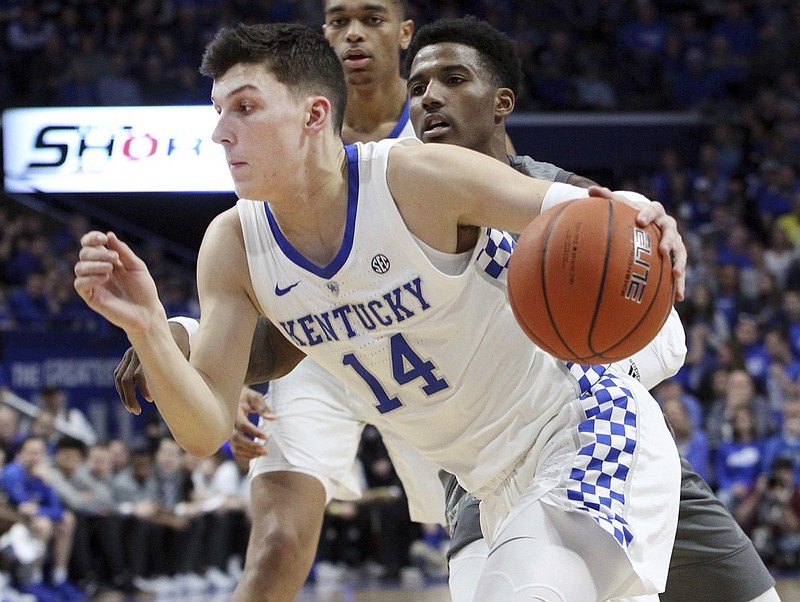Like most if not all of its Southeastern Conference basketball brethren, the University of Kentucky typically hosts a media opportunity to interview its coach and players on the day before its games.
With the Wildcats visiting Vanderbilt tonight at 9 EST on ESPN, Monday was UK's most recent media event. And it figured to be as noncontroversial and non-headline-grabbing as most of those held anywhere at any time until associate coach Kenny Payne, who was subbing for head coach John Calipari, described freshman guard Tyler Herro as a "dog."
Asked his definition of "dog" regarding Herro, Payne explained thusly: "In my dictionary, it means an alpha, that 'I will fight you for everything you get. I'm not just a white kid who can shoot. I can play.'"
Not just a white kid who can shoot. For anyone who's ever so much as shot a single worn rubber basketball through a frayed or rusty playground net, that stereotype of the white shooter is at least 50 years old, dating back to the earliest days of desegregation. It got a slight update with the release of the movie "White Men Can't Jump" in 1992.
And as with any stereotype, there are reasons for its presence. Black guys could run and jump and rebound and defend and dunk. White guys, such as the Jimmy Chitwood character in the movie "Hoosiers," could shoot.
In the real life of the NBA, LeBron James can play, Dirk Nowitzki can shoot.
Perhaps because of that there seems to be a "no harm, no foul" view of Payne's words, though Herro later told the Kentucky media: "I guess I don't want to be labeled just because I'm white that I'm a shooter. If you don't look at my skin color and we just go and play basketball, you're not going to say I'm a white kid that can just shoot."
Even Kansas coach Bill Self said of Herro after the Jayhawks' 71-63 loss to the Cats on Saturday: "I thought (he) is really an underrated defender in my eyes, from what I saw."
But what if Calipari had said fellow UK freshman guard Ashton Hagans doesn't see himself as "just a black kid who can defend"?
What might the media fallout from that have been? How quick would it have made its way to the ticker that runs along the bottom of ESPN's telecasts? Or possibly even CNN? How long would it have taken any number of commentators to say Coach Cal was "out of touch," or that he needs to apologize to the African-American community for stereotyping?
This is not meant to beat up Payne, or ask that he apologize to white basketball players everywhere. If you closely study his words, he didn't even say that he viewed Herro in those terms, but that he believed Herro viewed himself as being more than a white kid who can shoot.
Not that the initial headlines from the media event necessarily painted it that way.
Beyond that, every word Payne said concerning Herro was meant as a compliment, and as a black man who has both starred and competed at the highest levels of his sport on both the college and professional levels, he has more perspective and knowledge on this subject than most.
Beyond that, had Payne merely said Herro was more than a shooter, he would have been the perfect definition of political correctness at a time when keeping the PC police off your tail at all times is, somewhat sadly, too often the difference between employment and unemployment.
It's also worth noting that Herro later admitted that most white players believe this is largely the perception of them.
"When you see a white kid," he said, "that's just the label that we get."
He also added, according the Lexington Herald-Leader, that he believes some folks even tend to dislike white players, though his example for that - former Duke player Grayson Allen - was probably more disliked for his whining and getting into physical altercations with opposing players than because of the color of his skin.
Nevertheless, Herro did say that someone taunted him on his Instagram account following the Kansas game by asking him when he was going to start "tripping people," which seemed to be a go-to defensive move for Allen.
If nothing else, all of this makes for a good story and debate. At least it should.
But eight days after we celebrated the birthday of Dr. Martin Luther King Jr., Payne's words were yet another painful reminder that we're never going to get to where we need to get to with race relations in this country until the color of one's skin isn't mentioned by either blacks or whites as a way to define a person.
Contact Mark Wiedmer at mwiedmer@timesfreepress.com.
